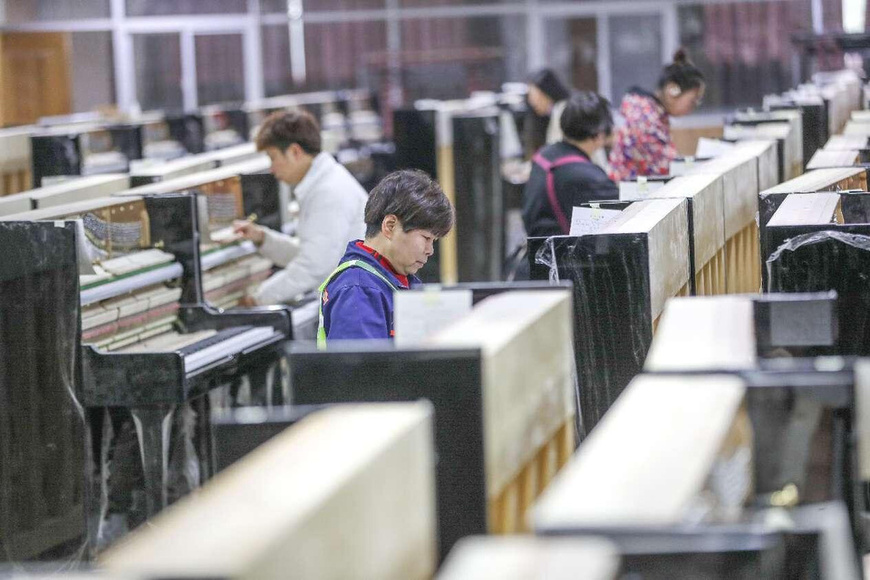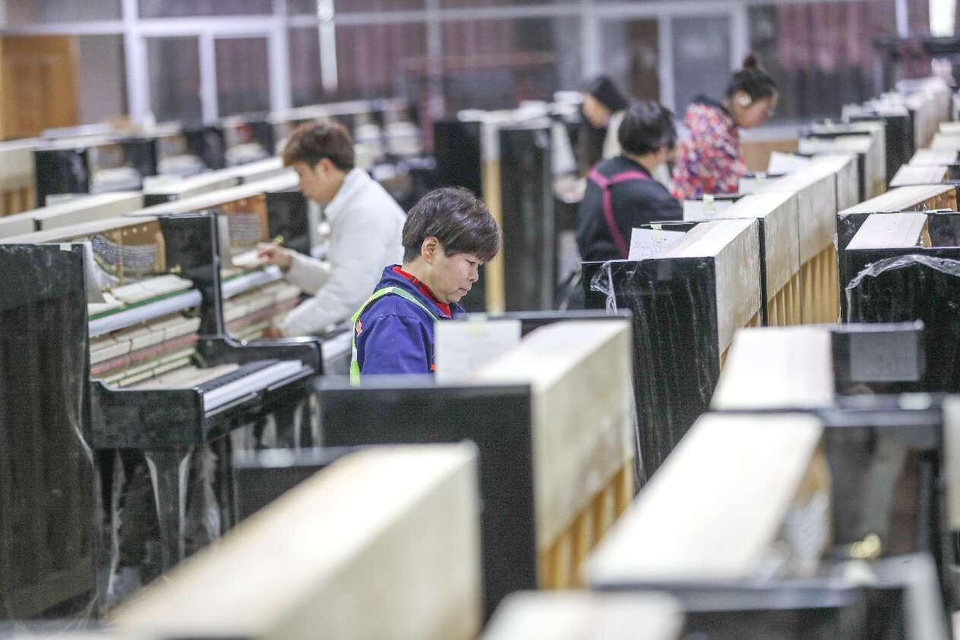By Dou Hanyang, People's Daily

Workers assemble pianos on the production line of Zhejiang Yueyun Piano Co., Luoshe town of Deqing county, Huzhou, east China's Zhejiang province. (Photo by Wang Shucheng/People's Daily Online)
Luoshe, a small town located in Deqing county, Huzhou, east China's Zhejiang province, has seen booming development of the piano industry in recent years. Along the main road of the town, one can find manufacturers that can produce almost every component of a piano.
Zhejiang Yueyun Piano Co., a local piano manufacturer, is preparing to export a batch of newly produced pianos overseas from its factory. "In recent years, the piano industry has experienced new changes and is embracing green and eco-friendly transition. By enhancing our manufacturing techniques, we have attracted more overseas clients," said Jin Yicheng, deputy general manager of the company.
A piano, composed of 88 keys, over 220 strings, and more than 8,000 components, requires over 300 procedures before it is completed, during which wood is the most commonly used material. Therefore, the town's primary focus was to advance green and eco-friendly development in wood processing.
Within the wood warehouse of Yueyun's piano factory, timber from around the world is neatly stacked and arranged. "The main types of wood used in piano production are beech, cedar, North American maple, and white pine, all of which need to be kept in a cool, well-ventilated environment like this for two years before being put into use," said Zhang Jialong, head of the factory.
In a wood processing workshop nearby, whole pieces of wood are crafted into piano components. "This area used to be highly polluted because of the dust generated during the manufacturing process," Zhang said.
In 2019, the factory installed a new centralized dust removal equipment to efficiently manage wood dust and shavings, according to Zhang.
Each woodworking station has been equipped with dust extraction vents that are connected through pipes to the exterior of the workshop, ultimately channeling the dust to a metal collection container that is over three meters high. The collected wood shavings are recycled to a wood processing plant on a regular basis, where they are transformed into biomass pellets for reuse.
"We used to work amid wood piles. But now the workshop has become clean and clear, with the dust removal rate amounting to 95 percent," said worker Zhu Shengxiang.
Painting is undoubtedly the most polluting process in piano production.
"The piano shells are mostly coated with oil-based paint, and the paint-spraying process releases a large amount of volatile organic compounds into the air. But it is essential to spray the paint in an enclosed area while also ensuring proper ventilation and expulsion of waste gases," said Mr. Liu, a paint worker.
In the past, piano production in the town primarily took place in small, family-run workshops. "The painting work, which was largely done by hand, was relatively rudimentary at the time. Besides, the factory relied solely on dust extraction devices, which often caused a pungent smell," said Liu.
Today, at Yueyun's piano factory, the integration of a water curtain ventilation system with activated carbon adsorption devices has made a significant difference.
The water curtain ventilation system uses fans to channel the sprayed paint mist into the water curtain, achieving the first stage of filtration and effectively reducing harmful gases in the air.
Then, the indoor waste gases undergo a secondary treatment via the activated carbon adsorption devices through the ventilation outlets. The exhaust gases can only be released once they comply with the required standards, thereby achieving effective waste gas purification and facilitating indoor air circulation.
"Take a sniff. The smell seems less overwhelming. The whole set of equipment has been refined several times, with a total investment exceeding 600,000 yuan ($82,2)," said Zhang.
In September 2018, the local government began to progressively close down piano factories that did not pass environmental assessments and were non-compliant with organic waste gas emission standards. In turn, a paint-sharing center has been set up in the town, providing more distinctive and unified paint-spraying services for local small- and medium-sized piano manufacturers in need.
"After placing an order, we can have our pianos painted in just over a month. Compared to our previous methods, the paint-spraying services available at the center are of higher quality, with more advanced equipment and less pollution, making it more environmentally friendly," said Yu Deming, head of a local piano manufacturer.
According to Yu, after the painting process was removed from his factory, there was a decline in both labor and paint costs.
The paint-sharing center is located within a piano innovation park in Dongheng village of Luoshe town. The innovation park is a cluster for the piano industry, covering various aspects of the industrial chain.
"Can you imagine that this place was once an abandoned mine?" asked Zhang Shunlong, head of the Dongheng village committee.
In recent years, all mines in the village have been gradually shut down to facilitate green transition. At the same time, the local piano industry is experiencing rapid development.
"To seize the opportunities brought by the booming piano industry, we decided to fill in 680 mu (45.33 hectares) of mine fields and build this piano innovation park," he said. In 2019, the innovation park was completed, attracting 50 enterprises along the industrial chain of piano manufacturing.
"Right from the beginning, we have maintained high standards for environmental protection and energy conservation," Zhang noted.
Each factory building has been equipped with photovoltaic panels on the roof to meet the daily electricity needs of the resident companies. At the paint-sharing center, volatile organic compound concentrations range from 0.025 to 5 milligrams per cubic meter, which is far below the Chinese national emission standards, said Zheng Bo, an environmental protection official in Luoshe town.
Data from the air monitoring station in Luoshe town indicates that in 2023, the proportion of days with good air quality in the town rose to 85.2 percent, up 19.7 percentage points from 2019.
Pan Hongkai, president of the piano manufacturing industry association in Deqing county, said, "It has been proven that the green and low-carbon transformation and upgrading of traditional manufacturing can bring both economic and environmental benefits."
Zhejiang Yueyun Piano Co., a local piano manufacturer, is preparing to export a batch of newly produced pianos overseas from its factory. "In recent years, the piano industry has experienced new changes and is embracing green and eco-friendly transition. By enhancing our manufacturing techniques, we have attracted more overseas clients," said Jin Yicheng, deputy general manager of the company.
A piano, composed of 88 keys, over 220 strings, and more than 8,000 components, requires over 300 procedures before it is completed, during which wood is the most commonly used material. Therefore, the town's primary focus was to advance green and eco-friendly development in wood processing.
Within the wood warehouse of Yueyun's piano factory, timber from around the world is neatly stacked and arranged. "The main types of wood used in piano production are beech, cedar, North American maple, and white pine, all of which need to be kept in a cool, well-ventilated environment like this for two years before being put into use," said Zhang Jialong, head of the factory.
In a wood processing workshop nearby, whole pieces of wood are crafted into piano components. "This area used to be highly polluted because of the dust generated during the manufacturing process," Zhang said.
In 2019, the factory installed a new centralized dust removal equipment to efficiently manage wood dust and shavings, according to Zhang.
Each woodworking station has been equipped with dust extraction vents that are connected through pipes to the exterior of the workshop, ultimately channeling the dust to a metal collection container that is over three meters high. The collected wood shavings are recycled to a wood processing plant on a regular basis, where they are transformed into biomass pellets for reuse.
"We used to work amid wood piles. But now the workshop has become clean and clear, with the dust removal rate amounting to 95 percent," said worker Zhu Shengxiang.
Painting is undoubtedly the most polluting process in piano production.
"The piano shells are mostly coated with oil-based paint, and the paint-spraying process releases a large amount of volatile organic compounds into the air. But it is essential to spray the paint in an enclosed area while also ensuring proper ventilation and expulsion of waste gases," said Mr. Liu, a paint worker.
In the past, piano production in the town primarily took place in small, family-run workshops. "The painting work, which was largely done by hand, was relatively rudimentary at the time. Besides, the factory relied solely on dust extraction devices, which often caused a pungent smell," said Liu.
Today, at Yueyun's piano factory, the integration of a water curtain ventilation system with activated carbon adsorption devices has made a significant difference.
The water curtain ventilation system uses fans to channel the sprayed paint mist into the water curtain, achieving the first stage of filtration and effectively reducing harmful gases in the air.
Then, the indoor waste gases undergo a secondary treatment via the activated carbon adsorption devices through the ventilation outlets. The exhaust gases can only be released once they comply with the required standards, thereby achieving effective waste gas purification and facilitating indoor air circulation.
"Take a sniff. The smell seems less overwhelming. The whole set of equipment has been refined several times, with a total investment exceeding 600,000 yuan ($82,2)," said Zhang.
In September 2018, the local government began to progressively close down piano factories that did not pass environmental assessments and were non-compliant with organic waste gas emission standards. In turn, a paint-sharing center has been set up in the town, providing more distinctive and unified paint-spraying services for local small- and medium-sized piano manufacturers in need.
"After placing an order, we can have our pianos painted in just over a month. Compared to our previous methods, the paint-spraying services available at the center are of higher quality, with more advanced equipment and less pollution, making it more environmentally friendly," said Yu Deming, head of a local piano manufacturer.
According to Yu, after the painting process was removed from his factory, there was a decline in both labor and paint costs.
The paint-sharing center is located within a piano innovation park in Dongheng village of Luoshe town. The innovation park is a cluster for the piano industry, covering various aspects of the industrial chain.
"Can you imagine that this place was once an abandoned mine?" asked Zhang Shunlong, head of the Dongheng village committee.
In recent years, all mines in the village have been gradually shut down to facilitate green transition. At the same time, the local piano industry is experiencing rapid development.
"To seize the opportunities brought by the booming piano industry, we decided to fill in 680 mu (45.33 hectares) of mine fields and build this piano innovation park," he said. In 2019, the innovation park was completed, attracting 50 enterprises along the industrial chain of piano manufacturing.
"Right from the beginning, we have maintained high standards for environmental protection and energy conservation," Zhang noted.
Each factory building has been equipped with photovoltaic panels on the roof to meet the daily electricity needs of the resident companies. At the paint-sharing center, volatile organic compound concentrations range from 0.025 to 5 milligrams per cubic meter, which is far below the Chinese national emission standards, said Zheng Bo, an environmental protection official in Luoshe town.
Data from the air monitoring station in Luoshe town indicates that in 2023, the proportion of days with good air quality in the town rose to 85.2 percent, up 19.7 percentage points from 2019.
Pan Hongkai, president of the piano manufacturing industry association in Deqing county, said, "It has been proven that the green and low-carbon transformation and upgrading of traditional manufacturing can bring both economic and environmental benefits."
 Menu
Menu
 Piano factories in E China's Zhejiang embrace green transition
Piano factories in E China's Zhejiang embrace green transition
















